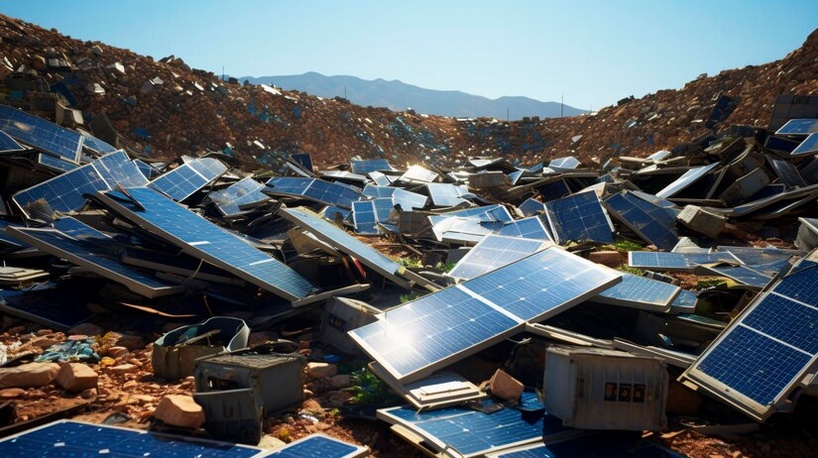Introduction
As the world transitions toward renewable energy sources to combat climate change, solar panels have emerged as a prominent and sustainable solution. These photovoltaic devices harness energy from the sun, reducing greenhouse gas emissions and dependence on fossil fuels. However, the rapid adoption of solar panels comes with an overlooked environmental concern: solar panel waste. This essay delves into the challenges posed by the growing issue of solar panel waste and explores potential solutions to mitigate its impact.
The Rise of Solar Energy and the Impending Waste Issue
The adoption of solar energy has witnessed exponential growth in recent years. Solar panels, which convert sunlight into electricity, are installed in homes, commercial buildings, and large-scale solar farms. The appeal of solar power lies in its clean, renewable, and sustainable nature, offering a promising alternative to conventional energy sources.
Despite the undeniable benefits of solar energy, the environmental implications of solar panel waste are often overshadowed. Solar panels have a finite lifespan, typically ranging from 20 to 30 years. As older panels degrade or become less efficient, they are retired and replaced with newer, more advanced models. This trend has led to a surge in solar panel waste that requires responsible management.
Challenges Posed by Solar Panel Waste
-
Toxic Materials: Solar panels contain various materials, some of which are hazardous to the environment. Crystalline silicon panels, for instance, may contain heavy metals like cadmium or lead. These toxic materials can pose a risk if not handled properly during disposal.
-
Resource Intensity: The production of solar panels requires significant resources, including rare earth elements, metals, and energy. Discarding these panels prematurely results in a loss of these valuable resources.
-
Limited Recycling Infrastructure: Unlike more common recyclables like glass or aluminum, solar panels present unique challenges due to their complex composition. Limited recycling facilities capable of handling solar panel waste exist, making recycling efforts difficult and costly.
-
Global Impact: The global nature of the solar industry means that waste management becomes an international issue. There is a need for harmonized regulations and standards for solar panel disposal and recycling.
Potential Solutions to Solar Panel Waste
-
Extended Producer Responsibility (EPR): Implementing EPR programs can make solar panel manufacturers responsible for the end-of-life management of their products. This approach encourages manufacturers to design panels with recyclability in mind and to fund recycling programs.
-
Improved Recycling Technologies: Investing in research and development of advanced recycling technologies can address the challenges associated with solar panel recycling. Innovations in processes to recover valuable materials from old panels can make recycling more economically viable.
-
Establishing a Circular Economy: Promoting a circular economy approach involves designing solar panels for easy disassembly and the recovery of valuable materials. Manufacturers should prioritize modular and easily replaceable components to extend the life of solar panels.
-
Public Awareness and Education: Raising public awareness about the importance of responsible solar panel disposal is crucial. Educational campaigns can inform consumers and industry stakeholders about the potential environmental hazards and the benefits of recycling.
-
Standardization and Regulation: Governments and international bodies should work together to establish clear and consistent regulations for the disposal and recycling of solar panels. Standardization can help create a framework for responsible end-of-life management.
-
Incentives for Recycling: Governments can provide incentives such as tax credits or subsidies to encourage the recycling of solar panels. Financial incentives can stimulate the growth of the solar panel recycling industry.
-
Research into Sustainable Materials: Continued research into alternative materials for solar panels can reduce their environmental impact. Materials that are easier to recycle and less toxic can contribute to more sustainable solar panel designs.
Conclusion
The growth of solar energy as a clean and sustainable power source is a significant achievement in the fight against climate change. However, the rapid adoption of solar panels brings with it a looming issue of solar panel waste that cannot be ignored. To address this challenge, it is essential to recognize the potential environmental hazards of solar panel waste and take proactive measures.
Challenges associated with toxic materials, resource intensity, limited recycling infrastructure, and the global impact of waste require coordinated efforts. Implementing extended producer responsibility programs, investing in recycling technologies, promoting circular economy principles, raising public awareness, and establishing clear regulations are all vital steps toward mitigating the impact of solar panel waste.
In embracing solar energy, we must also embrace the responsibility of managing its waste sustainably. The continued growth of the solar industry should go hand in hand with a commitment to reducing its environmental footprint. Through collaboration, innovation, and a commitment to responsible waste management, we can ensure that solar energy remains a clean and sustainable solution for generations to come.


No comments yet